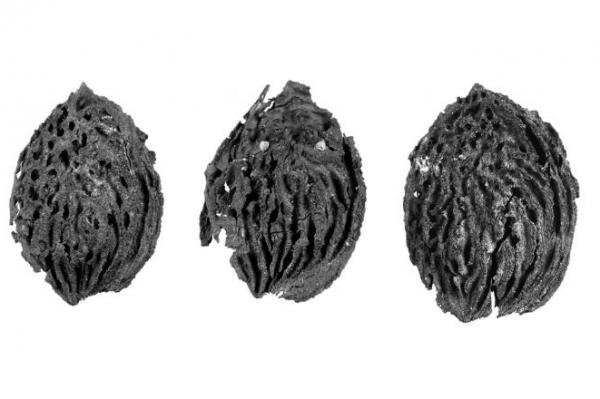Studies have suggested the peach originated in China, and the latest discovery supports this claim.
By Brooks Hays | Dec. 2, 2015 at 10:28 AM

These fossilized peach pits are 2.5 million years old. Photo by Penn State/Scientific Reports
Long before Kramer exalted the virtues of the Mackinaw, ancient peach trees offered up their fruits to the animals of ancient China.
Recent tests conducted at Pennsylvania State University suggest a handful of peach pits discovered near a bus stop in China are the oldest ever found -- 2.5 million years old.
The test results were detailed in a new paper published this week in the journal Scientific Reports.
"The peach was a witness to the human colonization of China. It was there before humans, and through history we adapted to it and it to us," researcher Peter Wilf, a professor of paleobotany at Penn State, said in a press release.
Studies have suggested the peach originated in China, and the latest discovery supports this claim.
Homo erectus, the hominid whose fossils have been found at dig sites in China, likely enjoyed the sweet nectar of ancient peach trees and their juicy fruits.
The pits were discovered by Tao Su, associate professor at Xishuangbanna Tropical Botanical Garden, preserved in an exposed rock outcropping.
"We found these peach endocarp fossils just exposed in the strata," Su said. "It's really a fantastic finding."
In analyzing the peach pits, Wilf and Su determined the fruits belonged to the genus Prunus, giving the plant the new name of Prunus kunmingensis.
The peaches eaten today are the product of human intervention and thousands of years of breeding, but the fruit first evolved on its own.
"Is the peach we see today something that resulted from artificial breeding under agriculture since prehistory, or did it evolve under natural selection? The answer is really both," said Wilf.
URL: http://www.upi.com/Science_News/2015/12/02/Scientists-find-worlds-oldest-peach-pits-near-Chinese-bus-stop/6041449066325/

